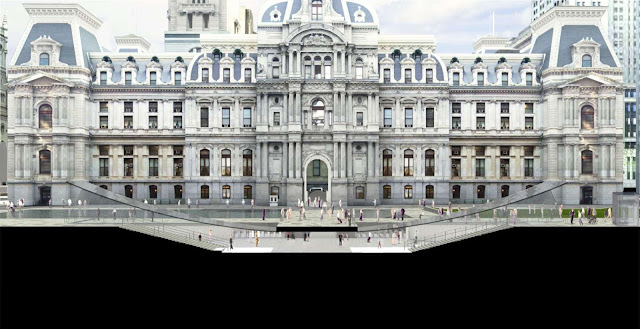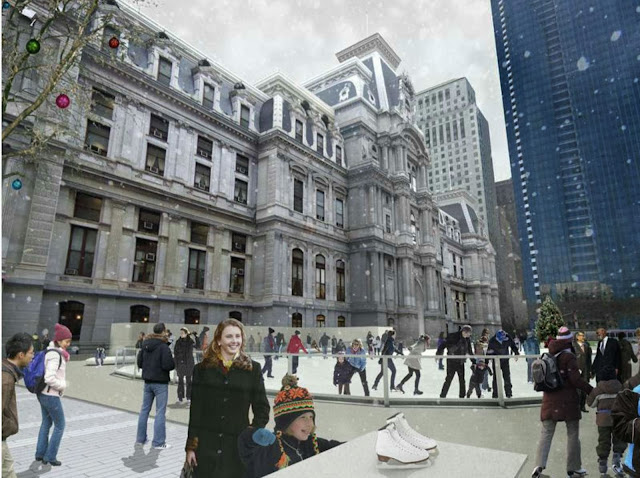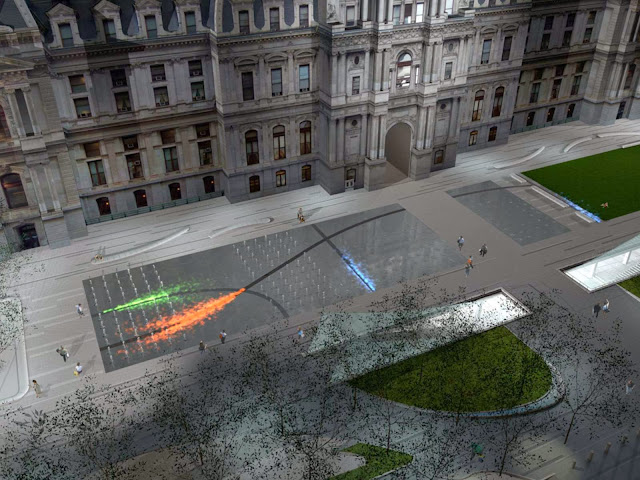"Local development non-profits City Center District (CCD) and Central Philadelphia Development Corporation felt that the existing public space, which was constructed in the 1970s, left much to be desired.
To improve this condition, the non-profits assembled a team of local design talent, including architecture practice Kieran Timberlake, landscape architecture studio OLIN, and civil engineering firm Urban Engineers. Now a new design for Dilworth Plaza is under construction and should be open for occupying sometime in 2014.
The design team’s goal was to create a more dignified civic plaza and to accentuate the area as a center for transportation, while improving access both to the subways as well as across the site. Starting with the floor, the team brought the entire plaza to a single level at the same grade as the sidewalk.
This change improved movement across the site, as now pedestrians will be able to walk on an axis with Market Street from 15th street. Access to the transit center underground is provided in two all-glass head houses, whose transparent forms make a minimal obstruction to views of city hall’s facade.
These head houses curve up on either side of the Market Street Walkway, the profiles of their roofs forming the bottom of a circle that encompasses the civic building. Digital displays mounted on railings that flank the head houses provide historical and other information to passersby.
The lawn is sloped to improve handicapped accessibility, and is built to host events such as outdoor movies and concerts. On the north side of the walkway, opposite the lawn, is a fountain, 185 feet long by 60 feet wide, which is fed by rainwater held in a cistern below the plaza.
It can also be drained in four minutes flat if the area is needed for large gatherings and can be transformed into an ice skating rink in the winter. The design also includes a café on the northern edge of the plaza that can accommodate 25 diners inside and has seating for about 100 outside.
About 80 percent of the planters that house the trees are outfitted for the dual purpose of stormwater management, capturing water that falls on site and holding it while it slowly seeps into the ground.
The remaining 20 percent could not provide this function because it stands atop the subterranean transit spaces, rather than the soil. The design’s most awe-inspiring feature is an art installation by Janet Echelman. Integrated into the fountain, it traces the path of the three subway lines that run beneath the site.
When trains arrive and leave the station, the installation tracks their progress with columns of dry mist that shoot several feet into the air. The mist is coded with the colors (provided by LEDs) associated with the three lines—blue, green, orange." Aaron Seward
Location: Philadelphia, USA
Architect: OLIN
Partner: Kieran Timberlake
Art Installation: Janet Echelman
General Contractor: Daniel J. Keating Company
Structural Engineer: CVM
Year Project: 2013
Owner’s Representative: Gilbane
Architect: OLIN
Partner: Kieran Timberlake
Art Installation: Janet Echelman
General Contractor: Daniel J. Keating Company
Structural Engineer: CVM
Year Project: 2013
Owner’s Representative: Gilbane
















